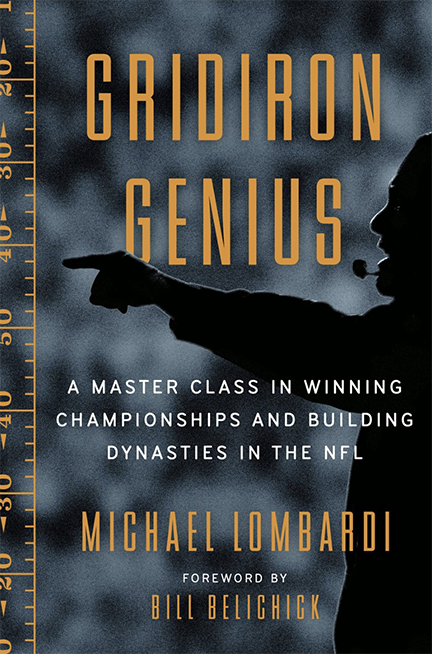Key Quote:
“Football is ultimately a business, and as in any successful business the most important ingredients are a sound culture, a realistic plan, strong leadership, and a talented workforce” (p. 7). — Michael Lombardi
Key Points
Organizational Culture
As Bill Walsh, innovative head coach of the 49ers and sports broadcaster famously said, “If we are all thinking alike, no one is thinking” (p. 11).
Bill Walsh created the 49ers’ “Standard of Performance,” a plan for constructing and maintaining a culture and organizational DNA for the perfect football franchise. His 17 principles intended to instill a winning attitude in every member of his organization, emphasizing a continuous push to learn more and strive for perfection.
Walsh thought that a football team was like a brand-new automobile. The finished product could only be as good as the assembly line that created it – down to the tiniest detail performed by the seemingly most insignificant worker (p. 12).
Walsh also frequently said, “Don’t be a copycat” (p. 25). Copycat leadership does not work.
Lombardi shares something the famous chef Emeril Lagasse taught about the matter of copying. Lagasse created simple dishes, yet never feared copying by others because he knew that following a recipe was very different from duplicating it. “It is the creator alone who understands just what the dish is trying to accomplish, and so he / she’s the only one who knows just how to make the ingredients work together” (p. 25).
The Coach: A Study in Leadership
Coaches first have to be great leaders. “In the ultimate team sport, real success doesn’t depend on tactics or discipline or order. It always comes down to how well a coach leads” (p. 35).
Lombardi lists five things coaches should be in command of:
“Command of the Room.” Followers need something to commit to. “Great leaders know how to grab a team’s attention and then show them what they’re all fighting for” (p. 35).
“Command of the Message.” Exceptional leaders have brilliant communication skills. “Players can’t accomplish anything unless they can visualize the path” (p. 37).
“Command of Self.” Being accountable allows leaders to share the blame and credit alike. “When a leader admits mistakes, it shows the team that he expects as much from himself as he does from his players” (p. 38).
“Command of Opportunity.” Leaders should never give up. It is likely that a first-time NFL coach will not be good. “You just have to keep working at it until you get good and pray that you don’t end up a one-hit wonder” (p. 42).
“Command of the Process.” Leaders must be fair and consistent. “When rules don’t apply to everyone, the ensuing chaos collapses whatever foundation a leader has tried so hard to build” (p. 43).
Team Building
Bill Belichick truly believed that “we are not collecting talent; we are building a team” (p. 63).
“You can’t judge a prospect on just one or two parameters no matter how incredible he may seem. A proper, successful evaluation has to include dozens of factors, countless hours of film study, and real-time confirmation from as many sets of eyes as possible” (pp. 68-69).
Lack of integrity and transparency can erode team chemistry faster than anything else. “The best teams force players to prove their value. They don’t give – or save – jobs on the basis of draft status” (p. 73).
Character is the hardest challenge for team builders. It can be assessed only face-to-face and everything always comes back to it. Character issues are complicated because they go beyond the locker room and often involve the entire team.
“It’s not the strength of the individual players; it’s the strength of how they function together” (p. 94). Players have to have mental toughness and determination. Belichick built hills near training facilities to hone players’ bodies and minds. “If players can fight past exhaustion, if they can focus when they’re completely drained, well that’s mental toughness” (p. 96).
An all-in culture is essential for a championship team. “There simply has to be a thread of unity running through any successful team, from the best players to the practice squad. I’m not saying they all have to like one another, but there has to at least be some level of mutual respect” (p. 102).
Seven Quarterback Qualities
“A Winning Way.” Winners know how to win, and losers know how to lose. Players who win know what it takes to be successful and are committed to doing the little things.
“A Thick Skin.” We can measure who we are based on how we react to something that doesn’t go our way. “If past performance is the best indicator of future achievement, those who have fought through bad times are likely to be able to do so again” (p. 128).
“Work Ethic.” “Your star quarterback needs to be a gym rat, pure and simple – first at practice, last to leave” (p. 129).
“Football Smarts.” Watching and studying are two different things. Game-day success comes from the time spent preparing oneself to think and play faster.
“Innate Ability.” Some are just born with certain instincts and intuition, as if, at their core, they were meant to do something.
“Carriage.” “Lousy body language” is worse than playing poorly. “Quarterbacks have to inspire” (p. 133).
“Leadership.” “Quarterbacks who fail to gain the respect of teammates leave a team rudderless” (p. 134).
Eleven Essential Rules of a Good Defense
“The Disguise Is as Important as the Defense.” Repetition breeds execution. “Core plays disguised with various looks and personnel groups create confusion” (pp. 142, 144).
“Studying an Offense Is the First Step Towards Stopping It.” You need to “know your opponent’s tendencies and spend time studying games played in styles reminiscent” of your own. Notice how your competition goes after other teams who play like your team does (pp. 144-145).
“Don’t Coach Defense, Teach It.” The difference between success and failure comes down to how well the players were taught. “The truth is that at their core, all good coaches are great teachers and communicators” (p. 147).
“Make the Offense Play Left-Handed” (p. 149). Take your opponent out of their comfort zones by preventing them from doing what they do best.
“Timing Is Everything, So Disrupt Your Opponent’s.” “If the Colts’ record-setting offense is based on timing between the quarterback and the receivers, the easiest way to defend it is to throw a wrench into that intricate mechanism” (p. 151).
“Defuse Explosive Plays.” “If we couldn’t make them play left-handed, then we could do the next best thing: take away their big play potential with sure tackling and an awareness of where their chunk plays came from” (p. 153).
“Remember Newton’s Second Law.” “Show me a fast-thinking, fast-moving defense and I will show you harder hits, more balls on the ground, and – all other things being equal – more wins” (pp. 154, 155).
“Think Pressure First, Sacks Second.” “Defenses need to be creative in the ways that they pressure the passer to make him throw before he wants to” (pp. 155-156).
“Eliminate Four-Point Plays.” “A third down when you’re backed up in your own territory is more important than a third down at midfield, because if you fail to convert, your opponent will have excellent field position” (p. 159).
“Games Are Won or Lost in the Final Four Minutes – of the First Half.” The best plan on defense is to keep the offense on the bench. “If the Patriots could manage a drive at the end of the first half and another at the beginning of the second, that would keep the opposing offense off the field for almost an hour of real-time” (pp. 162, 163).
“If You’re Not Talking, You’re Not Winning.” Players have to communicate, especially when they are focused on individual tasks. “Defenses succeed only if the players know the scheme” (p. 165).
Preparation and Improvisation
Bill Belichick emphasized rigorous preparation. And as Lombardi explains, “Belichick will be the first to tell you that experience is not preparation” (p. 169).
“Practice execution becomes game-day reality. Unless we can make our practice cut blocks convincing, we won’t be prepared to defend the Ravens’ go-to running play” (p. 179).
“Part of [Belichick’s] game prep this week is to avoid overcomplicating things for the players. It’s his job to decipher the avalanche of information that will flow through our staff over the next five days” (p. 183).
Leaders must remain calm during stressful situations. Players are aware of behaviors or routine changes. If players think you are tense, they will be tense.
Game plans require adjustments on game day, but adjustments shouldn’t be an attempt to fix what is broken or to find an opponent’s weaknesses. “Teams need to have backup plans long before kick-off. Successful in-game tweaks are born of a clear understanding of what the other side is doing to keep you from accomplishing your goals” (p. 220).
Belichick’s Guiding Principles
“Combat” Complacency. It takes 10,000 hours of practice to master anything, and once mastery occurs, it can be undermined by boredom. “Belichick never allows himself to get bored, which means he never cuts a corner or underestimates an opponent. He never thinks he knows it all even if he’s played a team a dozen times” (p. 229). It’s easy to become close-minded, authoritarian, and lazy. “Instead of hiding or denying their shortcomings, the Bills embraced them and tried to correct them” (p. 231).
Make Tough Decisions. Leaders have to measure the risk/reward of any potential transaction. Belichick is known for his ability to never let emotions interfere with decisions. He can connect deeply with players as a coach, but also instantly put those feelings aside as a general manager to calculate a player’s true economic worth.
Develop a “Winning Temperament.” “A realistic optimist may seem a crank to casual observers, but in actuality, he’s quite content” (p. 239).
On Building a Championship Team
Lombardi closes his book with several key principles.
“Culture Comes First.” “You can have the best game plan (or strategy or tactics), the best team (or product or service), and the best players (or engineers or salespeople), and you may achieve short-term success. But if you haven’t created an underlying ecosystem of excellence, short-term success is all it will ever be” (p. 257).
“Press Every Edge All the Time, Because Any Edge May Matter Anytime.” “The great ones understand that a focus on details is crucial not because they know what will matter when but because they don’t” (p. 257).
“Systems Over Stars.” “Talent matters, but willingness to buy into the program matters more” (p. 257).
“Leadership is a Long-Term Proposition.” “True leaders always value sustainable success over quick fixes” (p. 257).
“You’re Never Done Getting Better.” “Greatness over time is in direct correlation to growth over time, and growth over time requires finding new ways to do the same old things. Real leaders, real achievers, real champions are never done learning” (pp. 257-258).
Lombardi, M. (2018). Gridiron Genius: A Master Class in Winning Championships and Building Dynasties in the NFL.

“Football is ultimately a business, and as in any successful business the most important
ingredients are a sound culture, a realistic plan, strong leadership, and a talented workforce.”
“You can have the best game plan (or strategy or tactics), the best team (or product or service), and the best players (or engineers or salespeople), and you may achieve short-term success. But if you haven’t created an underlying ecosystem of excellence, short-term success is all it will ever be.”
